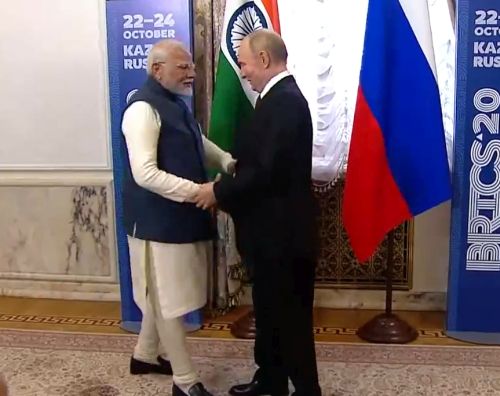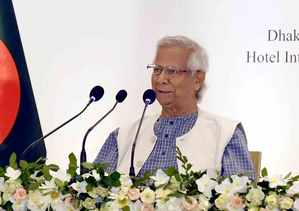International
IANS Analysis: Is PLA facing distrust of Chinese Communist Party?
New Delhi: This year, China’s People’s Liberation Army (PLA) has undergone significant changes, including purges and restructuring efforts.
Since Xi Jinping assumed office in 2012, the PLA, the world’s largest military force, has been under his ‘modernisation’ programme, aiming to transform into a fully modern military power by 2027.
This modernisation plan involves the development of advanced military hardware, including modern drones, missiles, fighter jets, and warships. This intent is also reflected in this year’s defence budget of $231.36 billion, marking a 7.2 per cent increase for the third consecutive year.
However, Xi’s ambitious plans have coincided with a rise in corruption cases within the PLA, notably involving top-level officials, a first in Communist China’s history. This situation raises the question: does corruption within the PLA signify a legitimacy issue for Xi Jinping, and is this why he harbours distrust towards the PLA?
Since assuming office in 2012, corruption has been a significant challenge for the Chinese President. Xi Jinping initiated an anti-corruption campaign by establishing the Central Commission for Discipline Inspection (CCDI), positioning it as the primary body to investigate corruption within the Communist Party.
This campaign extended even to senior military officials, as Xi pledged to target both “tigers and flies.” Consequently, the number of prosecutions against high-ranking officers increased sharply following the CCDI’s inception in 2013.
The campaign’s severity is evident from the removal of over 100 senior PLA officials from their posts in 2017 alone. Additionally, the CCDI is believed to have purged a total of 294 senior PLA officials to date. There was a 40 per cent rise in corruption investigations last year compared to the previous year, including 45 senior officials, of whom 27 are retired.
Investigations of corruption cases involving military officials in China are typically conducted behind closed doors. The sudden purges and disappearances of senior officials, particularly notable since last year, indicate the Chinese Communist Party’s (CCP) preference for keeping graft cases within the PLA, which directly pledges allegiance to the CCP, under wraps.
Former Defence Minister Li Shangfu vanished from public view for two months, with his removal only being officially announced seven months after his appointment as Defence Minister in March 2023.
A month prior to this announcement, eight other senior officials were reported to be under investigation for suspected faulty arms procurement, although the CCP provided no official explanation. Subsequently, the removal of nine senior PLA officials was announced, again without any explanation.
The purges and abrupt replacements of Commander Li Yuchao, Commissar Xu Zhongbo, and deputies Li Guangbin and Zhang Zhenzhong of the PLA Rocket Force (PLARF) on suspected embezzlement and espionage charges since June last year further highlight the deep-rooted graft within Xi’s PLA.
Last month, former Defence Ministers Wei Fenghe (2018-2023) and Li Shangfu (March-October 2023) were dismissed on charges of “serious violations of discipline and law” (corruption), including seeking personal benefits, resisting investigation, and accepting large bribes.
Both ministers were not only stripped of their military ranks but also expelled from their positions in the party. The other eight senior officials purged in September last year were also expelled from their National People’s Congress membership.
This implies that these former officials could face imprisonment if found guilty of the criminal charges against them, as they no longer have the immunity provided by their NPC membership.
Significantly, the positions held by those purged from the PLA are of interest. As previously mentioned, top officials of the PLA Rocket Force (PLARF), including Commander Li Yuchao, Commissar Xu Zhongbo, and Deputies Li Guangbin and Zhang Zhenzhong, were removed from their roles last year. Former Defence Minister Wei Fenghe also served as PLARF’s first commander. The frequency of these purges indicates that PLARF has become a focal point for corruption.
PLARF, an elite military branch, oversees the PLA’s nuclear weapons and ballistic missiles, which Xi Jinping has described as the “core of strategic deterrence, a strategic support to the country’s major power status, and a foundation for national security.”
Xi’s New Year message, envisioning China’s reunification “on both sides of the Taiwan Strait” in line with his goal of ‘Chinese rejuvenation,’ alongside escalating territorial disputes in the South China Sea this year, suggests his intention of possibly engaging in future conflicts for territorial gains.
Therefore, the role of PLARF is more critical than ever, and the surge in corruption cases poses a hindrance to Xi’s ambitions. This is reflected in his emphasis on the need for party self-reform in his political doctrine. Li Shangfu, before becoming Defence Minister, headed the PLA’s Equipment Development Department (2017-2022). Issues in China’s defence procurement have been cited as reasons for the recent purges.
According to a 2018 study by China’s Naval University of Engineering, the PLA’s equipment procurement was involved in ‘bid rigging’ practices, negatively impacting the PLA’s combat capabilities.
A US intelligence report highlighted instances of Chinese missiles filled with water instead of fuel, making them ineffective for launching, and entire fields of silos with improper lids in Western China, showcasing how corruption in the Chinese military is undermining Xi’s military modernisation efforts.
In this context, the replacement of the PLA Strategic Support Force (SSF) with the Information Support Force (ISF) in April is significant. Established by Xi Jinping in 2015, the PLA SSF was part of an effort to reform the PLA, alongside the Army, Navy, Air Force, and Rocket Force, all commanded by full theatre-grade generals.
As a combat force prioritising national security, the SSF integrated cyber, space, electronic, and psychological warfare. However, the restructuring of the SSF into the ISF is believed to be driven by potential corruption cases.
General Ju Qiansheng, former SSF Commander, and Lieutenant General Shang Hong, former SSF Deputy Commander, disappeared from public view earlier this year, raising suspicions that their absences may be linked to corruption investigations.
The transition to the ISF represents a subtle shift in Xi’s military strategy. With the establishment of the ISF, the PLA now comprises four services; Army, Navy, Air Force, and Rocket Force—and four branches—aerospace, cyberspace, ISF, and Joint Logistic Support Force.
The ISF was created to enhance informationisation as a new strategic arm of the PLA, tasked with building a network information system to meet modern warfare requirements. However, unlike the SSF’s leader, the new ISF head, Lieutenant General Bi Yi, is of deputy-theatre-command-leader grade, which appears to be a demotion in rank.
The purges within the PLA and Xi Jinping’s unwavering objective to eradicate corruption highlight a disruption in the stability of his leadership. This poses a significant challenge for the Chinese President at a time when his territorial ambitions in Taiwan and the South China Sea are at their peak, necessitating not only the enhanced combat capability of the PLA but also loyal and obedient officials ready to engage in warfare at his command.
However, disloyalty among PLA members has been another obstacle, as seen in the case of General Liu Yazhou, a senior Air Force Commander, who faced a death sentence for “serious economic corruption” after expressing disagreement with Xi’s military aggression policy regarding Taiwan.
These military purges can thus be interpreted as Xi’s way of punishing dissenters within the PLA, reflecting his leadership instability and failure to appoint loyalists to top positions despite his personal endorsement.
The placement of the ISF under the direct control of the Central Military Commission, China’s top military body headed by Xi, is intended to enhance his oversight of factions within the PLA.
Xi aims for the ISF to “resolutely obey the party’s command” and ensure its members remain “absolutely loyal, pure, and reliable.” Therefore, the purges and subsequent restructuring within the PLA are rooted in Xi’s issues of legitimacy and his distrust of the PLA.
–IANS
dan/
International
Lee Hsien Yang seeks refuge in United Kingdom

Lee Hsien Yang, the youngest son of Singapore’s founding father, the late Lee Kuan Yew, announced on Tuesday that he is now a political refugee in the United Kingdom after seeking asylum from the British government “as a last resort.”
“I remain a Singapore citizen and hope that someday it will be safe to return home,” Lee stated in a Facebook post, as reported by Channel News Asia (CNA).
Citing what he described as the Singapore government’s “attacks” against him, Lee, who is the younger brother of former Prime Minister Lee Hsien Loong, revealed that he sought asylum protection in 2022.
Lee Hsien Yang and his late sister, Lee Wei Ling, who passed away earlier this month, have been in conflict with their brother Lee Hsien Loong over the fate of their father’s home following his death in 2015, resulting in a public dispute that has estranged the siblings.
In an interview with the UK-based newspaper The Guardian, Lee alleged that a “campaign of persecution” compelled him to seek asylum in Britain.
In response to his claims, the Singapore government stated that there is “no basis” for his allegations of “a campaign of persecution” or other assertions regarding political repression in the country.
“Singapore’s judiciary is impartial and makes decisions independently. This is why Singaporeans have a high level of trust in the judiciary,” a government spokesperson remarked.
The spokesperson added that there are no legal restrictions preventing Lee and his wife, lawyer Lee Suet Fern, from returning to Singapore. “They are and have always been free to return to Singapore,” the spokesperson said.
Lee and his wife have been outside of Singapore since 2022, having opted not to attend a scheduled police interview regarding potential offenses related to providing false evidence in judicial proceedings concerning their father’s will and the family home.
Lee and his late sister, who had been living at the property, alleged they felt threatened while trying to fulfill their father’s wish to demolish the house. They also accused their elder brother, former Prime Minister Lee Hsien Loong, of abusing his governmental influence to advance his personal agenda.
International
Indo-Russian ties are stronger than ever before at BRICS

Kazan, Russia: Prime Minister Narendra Modi held a bilateral meeting with Russian President Vladimir Putin on the sidelines of the 16th BRICS Summit.
During the meeting, President Putin remarked, “I recall our meeting in July, where we had productive discussions on various issues. We’ve also spoken over the phone several times. I am very grateful you accepted the invitation to come to Kazan. Today, we will attend the BRICS Summit’s opening ceremony, followed by dinner.”
PM Modi responded by expressing his appreciation, saying, “I sincerely thank you for your friendship, warm welcome, and hospitality. It’s a great pleasure to visit such a beautiful city as Kazan for the BRICS Summit. India shares deep historical ties with this city, and the opening of our new embassy here will further strengthen these connections.”
International
Laos seeks to enhance nutrition amid climate change concerns

Vientiane (Laos), Aug 22 (IANS) Representatives from the Lao government and development partners have attended a conference here titled “Climate Change and Nutrition in Laos: Intersections and Interventions” to discuss the impact of climate change on nutrition in the Southeast Asia country and potential solutions.
Speaking at the conference, deputy director general of the Department of Hygiene and Health Promotion under the Lao Ministry of Health Viengkhan Phixay, said, “We gather to address a critical and interwoven issue: the impact of climate change on nutrition and how we can work together to tackle these challenges,” Xinhua news agency reported.
The Lao government is actively engaged in this endeavor, with numerous policies and initiatives aimed at addressing both climate change and nutrition, Lao National Television reported on Thursday.
“By leveraging the Scaling Up Nutrition network in Laos, which is led by the government, and supported by civil society, donors, and the United Nations, we have a robust platform to tackle the negative impacts of climate change while improving nutrition and overall health for everyone in Laos,” Viengkham said at the conference held on Monday.
The conference featured a series of presentations that not only detailed evidence-based research but also introduced innovative tools for measuring and enhancing nutrition under the impact of climate change.
The conference stressed the critical need for integrated approaches to tackle the intertwined challenges of climate change and nutrition, and setting the stage for impactful future collaborations.
–IANS
int/psd
International
One killed, seven injured in shootout in Iraq

Baghdad, Aug 22 (IANS) A civilian was killed while seven others were injured on Thursday in a tribal shootout in Iraq’s holy Shiite province of Najaf, according to a local security source.
The shootout erupted in the early hours between armed men from the local tribe in the al-Zarga area in northern Najaf, some 160 km south of Baghdad, a local police officer told Xinhua on condition of anonymity.
The clash resulted in the killing of an Iraqi civilian and the injury of seven others, including three Iranian Shiite pilgrims, the source added.
A joint force from the Interior Ministry’s emergency response division and Najaf provincial police arrested 53 gunmen from both sides of the shootout and seized weapons and ammunition, the Interior Ministry said in a statement.
It added that search operations are ongoing to locate additional gunmen and weapons, with more details to be released later.
The incident took place as numerous pilgrims traveled to the city of Karbala to observe Arbaeen, which marks the end of a 40-day mourning period for the killing of Imam Hussein, the grandson of Prophet Muhammad, in the Battle of Karbala in 680 A.D.
Typically, these pilgrims also visit Najaf as part of their journey to Karbala.
–IANS
int/jk/arm
International
Bangladesh seeks $1 billion budget support from World Bank

Dhaka, Aug 22 (IANS) Bangladesh’s interim government has sought $1 billion from the World Bank as budgetary support.
The call came from the country’s Power, Energy and Mineral Resources Adviser Muhammad Fouzul Kabir Khan’s meeting with Abdoulaye Seck, the World Bank’s Country Director for Bangladesh and Bhutan, in Dhaka on Wednesday.
He made the plea as the ministry owes more than 2 billion dollars to suppliers in import costs of power and energy, Xinhua news agency reported.
Khan mentioned that the interim government, which was formed with many pressing mandates, is due to settle a $2 billion debt left by the previous government in the power sector.
He said they have already suspended activities under the much-criticized Quick Enhancement of Electricity and Energy Supply Act 2010 and abolished the government’s power to set energy prices without any public hearing.
On August 5, the former Prime Minister of Bangladesh, Sheikh Hasina, was ousted from her country and power, ending her rule since January 2009.
This event was seen as a massive escalation, with what initially started as student’s protests and resulted in a major crisis in Bangladesh.
Earlier on August 8, Nobel laureate Muhammad Yunus took oath as the head of Bangladesh’s interim government.
–IANS
int/jk/as
-
Video2 years ago
PM Modi Attacks Congress in Karnataka with “Kerala Story”
-
Politics2 years ago
Siddaramaiah & DK Shivakumar sworn in as Chief Minister & Deputy CM respectively
-
Cricket2 years ago
CSK players rejoice 5th IPL title with their families (Pics)
-
Entertainment2 years ago
Karan Deol weds his longtime Girlfriend Drisha Acharya (Pics)
-
Sports7 years ago
History Of Official FIFA WORLD CUP Match balls
-
India2 years ago
Ashwini Vaishnaw: Railway Board recommends CBI probe in the Odisha railway disaster
-
Entertainment2 years ago
Urvashi Rautela dazzles on Cannes 2023 red carpet (Pics)
-
Entertainment2 years ago
Sunny Leone gets ready for Kennedy premiere in Cannes (Pics)






























